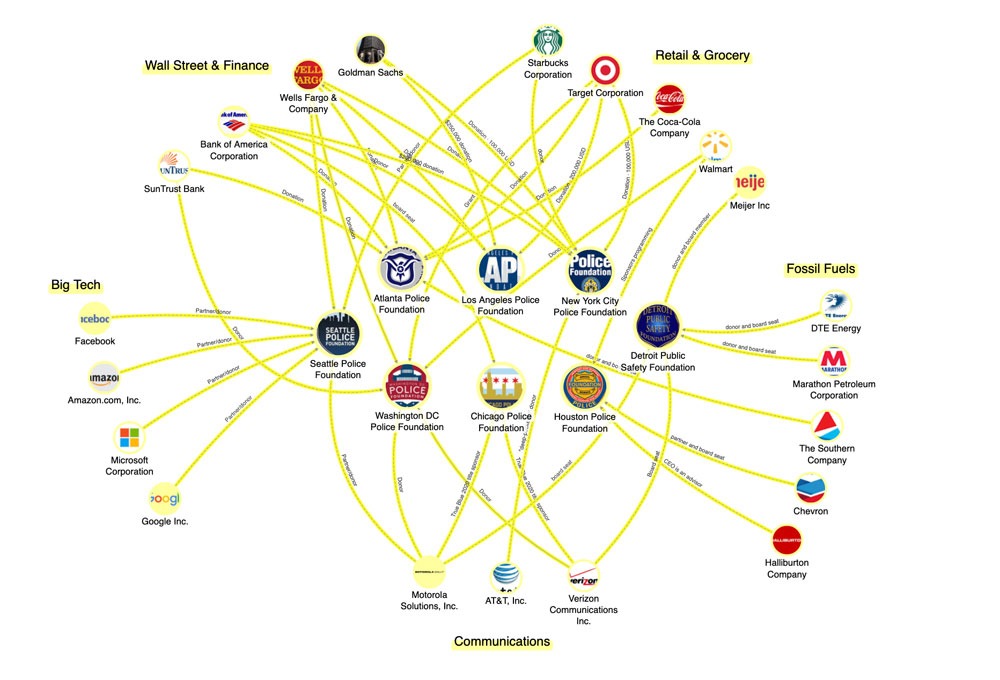
June 18, 2020; Guardian
Even as a number of tech companies have declared moratoria on projects like facial recognition software, a group called the Public Accountability Initiative describes the influx of corporate money to private police foundations through its LittleSis project.
What that looks like seems particularly important as calls for police accountability and an end to militarization of the police have reached clear across the country. Here is what the report says:
The Houston police foundation has purchased for the local police department a variety of equipment, including SWAT equipment, sound equipment and dogs for the K-9 unit, according to the report. The Philadelphia police foundation purchased for its police force long guns, drones and ballistic helmets, and the Atlanta police foundation helped fund a major surveillance network of over 12,000 cameras.
According to the Guardian, the foundations are used for a variety of purposes meant to “supplement” discretionary police spending without the need to go through a public review process. With the money, they purchase such extras as surveillance technology and weaponry that’s not funded, approved, or monitored by the public.
These foundations receive millions of dollars a year from private and corporate donors, according to the report, and are able to use the funds to purchase equipment and weapons with little public input. The analysis notes, for example, how the Los Angeles police department in 2007 used foundation funding to purchase surveillance software from controversial technology firm Palantir. Buying the technology with private foundation funding rather than its public budget allowed the department to bypass requirements to hold public meetings and gain approval from the city council.
Sign up for our free newsletters
Subscribe to NPQ's newsletters to have our top stories delivered directly to your inbox.
By signing up, you agree to our privacy policy and terms of use, and to receive messages from NPQ and our partners.
If this story sounds familiar, readers may be recalling a story about the Arnold Foundation’s funding of an aerial surveillance system for Baltimore. But this report is focused on the funding done by corporate foundations like Starbucks, which donates to the Seattle Police Foundation and has a seat on its board, and Bank of America, which has seats on the boards of the police foundations both in Chicago and New York City where it has given hundreds of thousands to the police foundation. Microsoft also has a seat on the board of the Seattle police foundation, and Facebook and Google are donors.
Target has a seat on the board of the Washington DC Police Foundation and has made major contributions there and to other police foundations around the country, including one amounting to $200,000 in 2007 that helped the L.A. police foundation buy surveillance equipment for the LAPD.
Finally, Larry Fink, CEO of BlackRock, the world’s largest asset manager, was a co-chair of the annual gala of the New York City Police Foundation three years running, starting in 2017. Color of Change started a petition demanding that Fink and BlackRock stop supporting the foundation. This relationship is consistent with the fact that BlackRock invests in private prisons. Fink’s use of philanthropy to normalize his profiteering off state sponsored civil violence is nothing if not prolific.
“Not a lot of people are aware of this public-private partnership where corporations and wealthy donors are able to siphon money into police forces with little to no oversight,” said Gin Armstrong, a senior research analyst at LittleSis, a PAI project that maintains “free wiki database detailing the connections between powerful people and organizations.”
Evan Greer, the deputy director of digital rights group Fight for the Future, says, “Corporations who cozy up to police, build surveillance software to them, or funnel them money through shady donations are actively propping up systemic racist violence and oppression.”
Activists in the art world have in recent years called out many of these relationships and it is time for the rest of the nonprofit, philanthropic and government sector to do the same. Its well past time to shut down or limit the police foundation as a workaround to avoid public governance.—Ruth McCambridge













